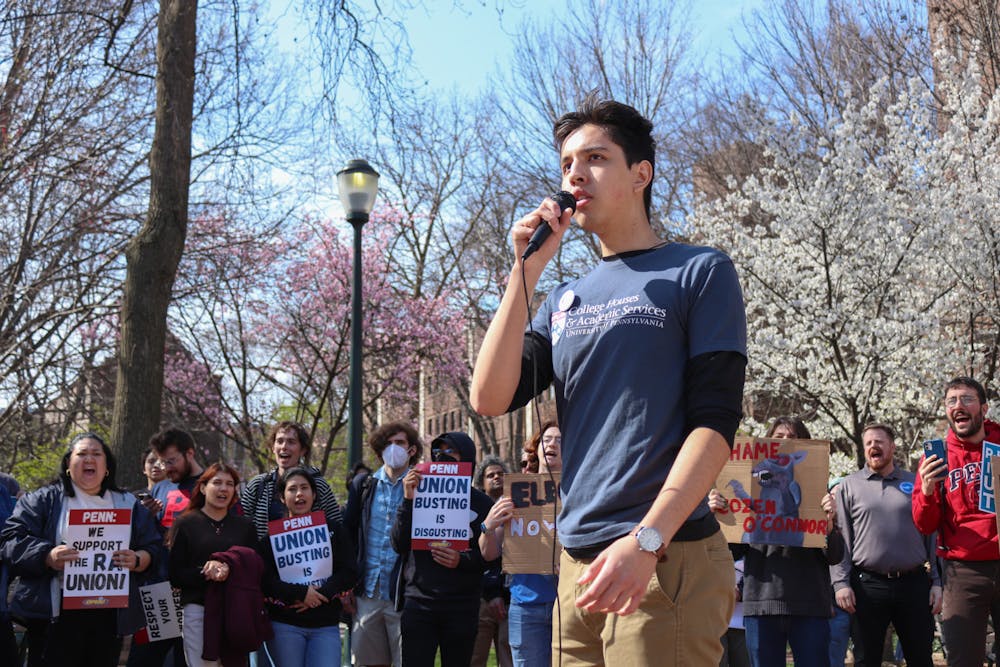
A rally in support of RA/GA unionization was held in front of Van Pelt Library on March 13.
Credit: Abhiram JuvvadiResident advisors and graduate resident advisors will vote Wednesday and Thursday on whether to unionize.
Over six months after a supermajority of RAs and graduate resident associates filed to unionize, a two-day election this week will determine whether the students will officially form a union. RAs have cited a need for democratic representation and other grievances against the University as central reasons to unionize ahead of the official election.
The vote will be held in the Golkin Room on the second floor of Houston Hall from 12 p.m. to 9 p.m. A simple majority of votes in favor of unionizing will allow the vote to pass and continue a trend among peer universities including Columbia University, Barnard College, Wesleyan College, and Tufts University.
OPEIU Local 153 organizer Scott Williams, a 2016 graduate of Penn’s Graduate School of Education, told The Daily Pennsylvanian that despite there being many new RAs this academic year, there is a “robust organizing committee” conducting individual outreach in favor of unionization. RAs held a town hall on Sept. 20 about the union, as well as an FAQ session on Sept. 24.
“We’re literally talking to everyone — not just the people who are new and not just the people who are returning,” Williams said. “We’re literally doing everything we can to talk to every single RA and ask them, ‘What are the issues you want to change? How can we make this job better? How can we do that with a seat at the table?’”
Williams said that if a union is formed after the votes are tallied on Thursday, the next step would be for the RAs and the GAs to nominate and elect a bargaining committee, which will be responsible for drafting proposals and collecting input from their peers.
"Everything is on the table," Williams added, when it comes to negotiating with the University. This could include retroactively changing existing contracts to meet union proposals, though he said that “it’s subject to negotiations.”
In response to a request for comment, University spokesperson Ron Ozio wrote “we encourage all RAs and GRAs to be as informed as possible and to vote on the significant issue of unionization.”
Previously, College House & Academic Services emailed a Frequently Asked Questions page to all RAs and GRAs that contains information about the unionization process. In an Aug. 14 Instagram post, United RAs at Penn wrote that this information contained "misinformation and misrepresentation of unionization and bargaining."
“These workers care about building a community, and they care about making this the best place for people to live, and that is why they’re unionizing — they want more resources, they want more support, and they want to make these communities stronger," Williams said.
College sophomore Omar Elsakhawy, a first-time RA in Fisher-Hassenfeld College House, told the DP that the ongoing unionization efforts did not affect his decision to become an RA, as he was already planning on applying due to the benefits that come with his position.
“Obviously, though, the unionization efforts reminded everybody that the job existed and reminded people of how important the role was,” Elsakhawy said.
Elsakhawy told the DP he will be voting in favor of forming a union at the election this week.
“You do not need to have grievances against an institution to form a union, as it is an important facet of being an employee of any institution,” Elsakhawy said, adding that he believes a union will provide him with democratic representation.
In addition to increased bargaining abilities, Elsakhawy also cited a “poor dining plan" that he said amounts to two dining swipes each week, a lack of compensation besides free housing, and the inability to participate in work-study. Instead of the current plan, Elsakhawy called for something akin to the first-year dining plan, a program valued at $6,330 per academic year.
“The University has the resources to do more, and they’re not,” Elsakhawy said.
Despite receiving free housing, Elsakhawy told the DP that “Penn has a very clever way of wringing the arms of low-income students behind their backs." He claimed that the University often labels jobs as "internships" or "student leadership opportunities," when “they are clearly jobs.”
College senior Conor Emery, a second-year RA in Harnwell College House, told the DP that the prospect of unionization made him “excited” to continue being an RA this academic year, adding that it would be an "opportunity for RAs to speak out about certain ways that we just haven’t been listened to in the past.”
Penn previously claimed that the RAs were not employees of the University but instead attempted to classify them as student leaders with an "educational relationship" to Penn since they are not on the payroll. However, in August, the National Labor Relations Board recognized Penn RAs and GRAs as employees, ordering an official union vote.
“This is one of the only ways that we can really make lasting change to better the position and make it so we can be better supporters of our residents,” Emery said.
The Daily Pennsylvanian is an independent, student-run newspaper. Please consider making a donation to support the coverage that shapes the University. Your generosity ensures a future of strong journalism at Penn.
Donate







